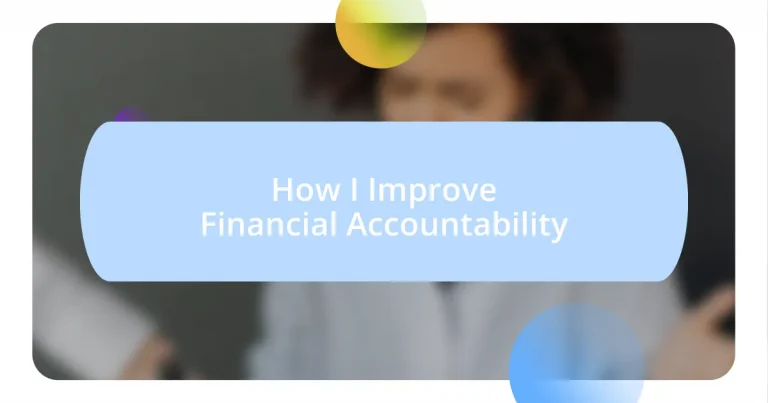Key takeaways:
- Financial accountability involves responsible money management, fostering transparency, and collaboration in financial discussions.
- Setting clear personal financial goals provides a roadmap for budgeting and influences spending and saving decisions.
- Regular tracking of income and expenses uncovers spending patterns and promotes a sense of financial security.
- Using tools and apps enhances accountability, making budgeting easier and providing visual progress on financial goals.
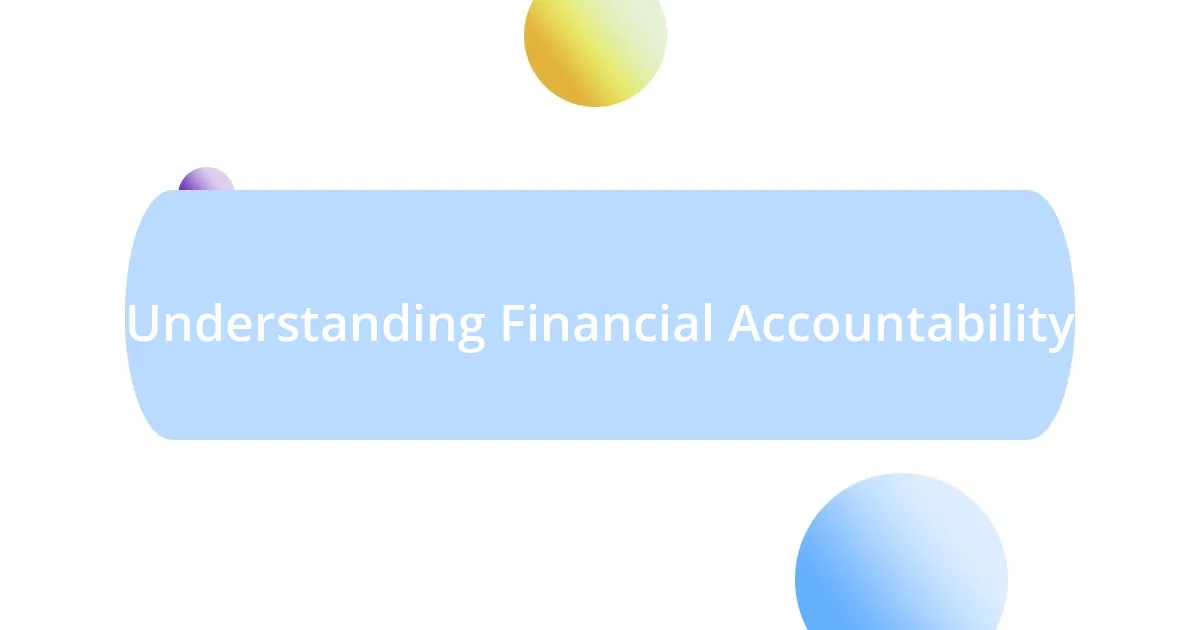
Understanding Financial Accountability
Financial accountability is essentially about being responsible for the management of money, both personally and within organizations. I remember when I first took control of my finances; it felt like learning a new language. Suddenly, I had to think about every dollar and my choices surrounding saving, spending, and investing. It was eye-opening to recognize how my decisions impacted not just my budget but my overall peace of mind.
At its core, financial accountability fosters transparency and trust. Have you ever noticed how much more empowered you feel when you have a clear understanding of your financial situation? I can recall a time when I sat down with my spouse to go over our expenses. That simple act of sharing created a bond, ensuring we were on the same page and holding each other accountable. It transformed our financial discussions from tension-filled points into opportunities for collaboration.
Understanding financial accountability means recognizing that it’s not just about the dollars but about the discipline and integrity behind each transaction. I’ve learned that by documenting my financial activities, I not only track where my money goes but also cultivate a habit of mindfulness. Isn’t it amazing how something as simple as keeping a budget can lead to immense clarity and control in our lives? It’s this sense of control that empowers us to make informed decisions for a brighter financial future.

Identifying Personal Financial Goals
Identifying personal financial goals is an essential step in achieving financial accountability. When I first sat down to set my own goals, it wasn’t just about numbers—it was about what those numbers represented for my future. I remember writing down aspirations like buying a home and attending a dream vacation, realizing these goals would shape my budgeting decisions moving forward. What about you? Have you considered how your aspirations influence your financial strategy?
Establishing clear financial goals allows for a roadmap, guiding spending and saving. For example, I prioritized short-term goals like building an emergency fund before tackling long-term ones like retirement savings. This approach felt achievable and less overwhelming. Breaking it down this way kept me motivated. Have you found that segmenting your goals helps you stay on track with financial planning?
Writing down my goals made them tangible, almost like a contract with myself. One evening, I reflected on my progress, and it felt powerful to see how far I’d come. Each milestone celebrated—no matter how small—was a reminder of my dedication to financial self-discipline. By putting my intentions on paper, I not only clarified my vision but also held myself accountable day by day.
| Short-Term Goals | Long-Term Goals |
|---|---|
| Building an emergency fund | Saving for retirement |
| Paying off credit card debt | Buying a home |
| Saving for a vacation | Funding children’s education |
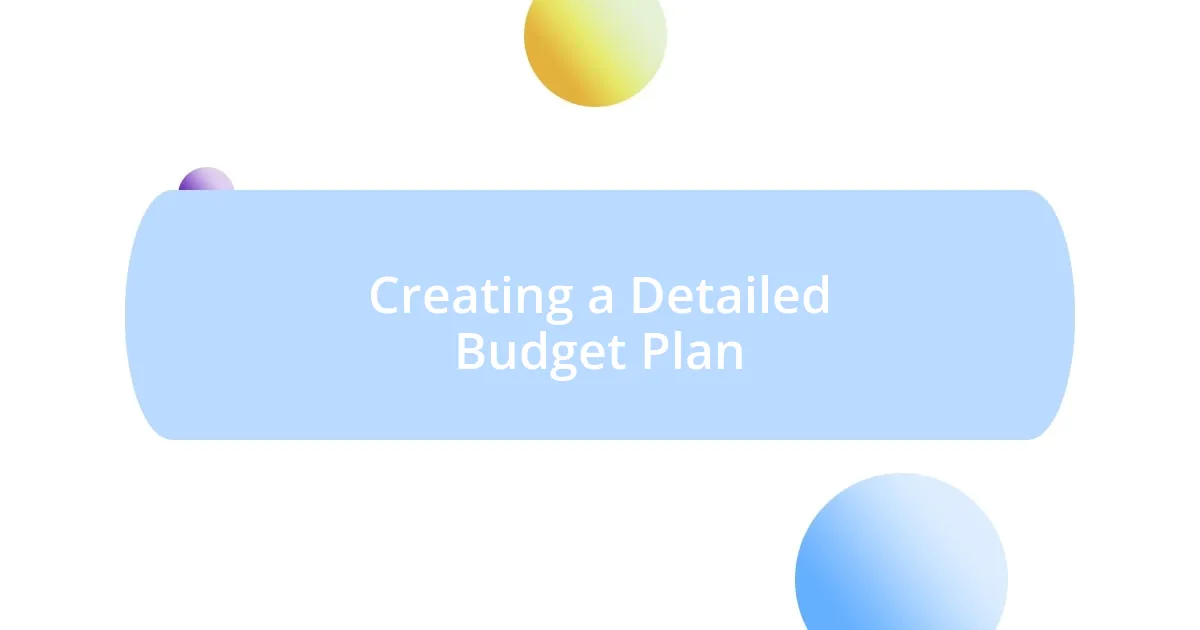
Creating a Detailed Budget Plan
Creating a detailed budget plan is one of the most effective methods I’ve found to enhance financial accountability. It’s more than just crunching numbers; it’s about understanding your spending habits and aligning them with your priorities. I recall the first time I listed out all my expenses. As I went through each item, from groceries to subscriptions, I was startled to discover how many small, recurring charges were sneaking into my budget. Documenting these expenses helped me visualize where I could cut back and save.
As you begin crafting your budget plan, consider these key elements to include:
- Income: List all sources of income. Knowing your total monthly income sets the stage for your budget.
- Fixed Expenses: Include unavoidable costs like rent, mortgage, or insurance.
- Variable Expenses: Factor in groceries, entertainment, and other discretionary spending.
- Savings and Investments: Allocate money towards savings goals, retirement accounts, or emergency funds.
- Debt Payments: Account for any outstanding debts, such as credit cards or loans.
I remember the sense of relief I felt when I finally had a comprehensive view of my financial commitments. It was like shining a light into a dark corner of my life. Budgeting became a game for me—a way to strategize, making sure my money worked as hard as I did. Exploring different budgeting methods, like the 50/30/20 rule, led me to tailor my own approach, ultimately fostering a deeper trust in my financial decisions.
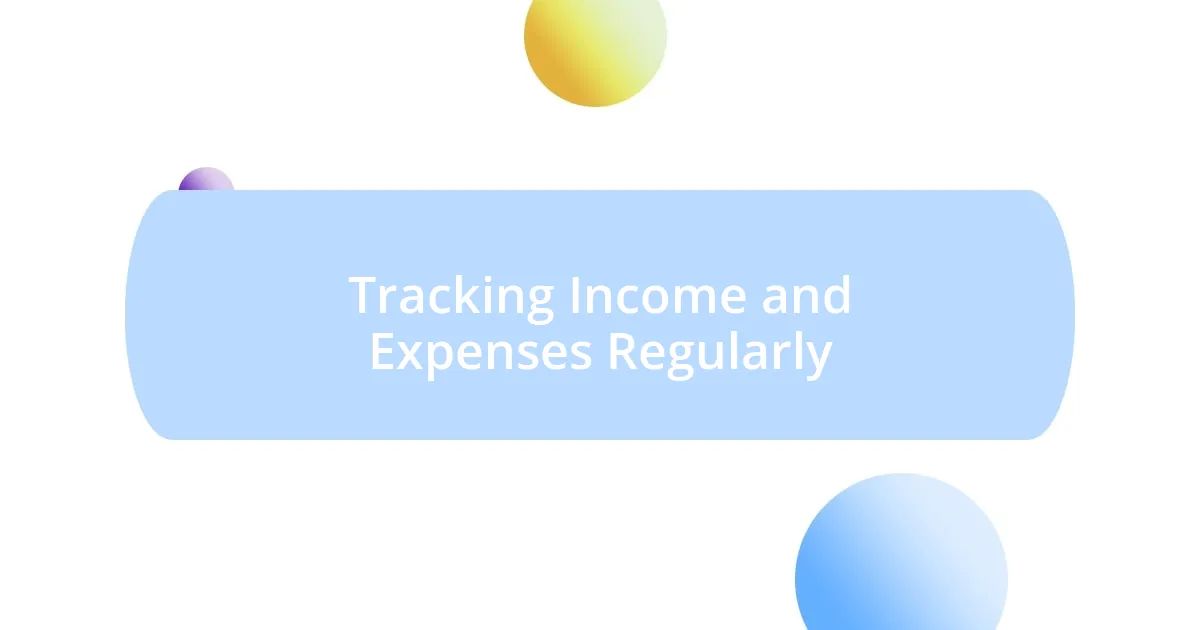
Tracking Income and Expenses Regularly
Tracking my income and expenses regularly has been a game changer for my financial journey. I remember when I decided to start using a simple spreadsheet to log every penny coming in and going out. At first, it seemed tedious, but as I watched the numbers add up, I gained insights into my spending patterns that I never expected. Have you ever thought about how much clarity tracking can bring to your finances?
What I found particularly eye-opening was how certain expenses—like that coffee shop I frequented—added up over the month. Just by jotting down my daily spending, I realized I could cut back without sacrificing my lifestyle. It was almost like uncovering a hidden treasure: less money spent on unnecessary items meant more funds available for my goals! Isn’t it funny how a little awareness can shift your entire perspective?
After consistently tracking my income and expenses for a few months, I felt empowered. I could see trends and predict future costs better than ever. This proactive approach not only made budgeting easier but also instilled a sense of financial security that I hadn’t felt before. Does that sense of control sound liberating to you? I found that embracing this practice wasn’t merely about numbers; it was about taking charge of my financial future.
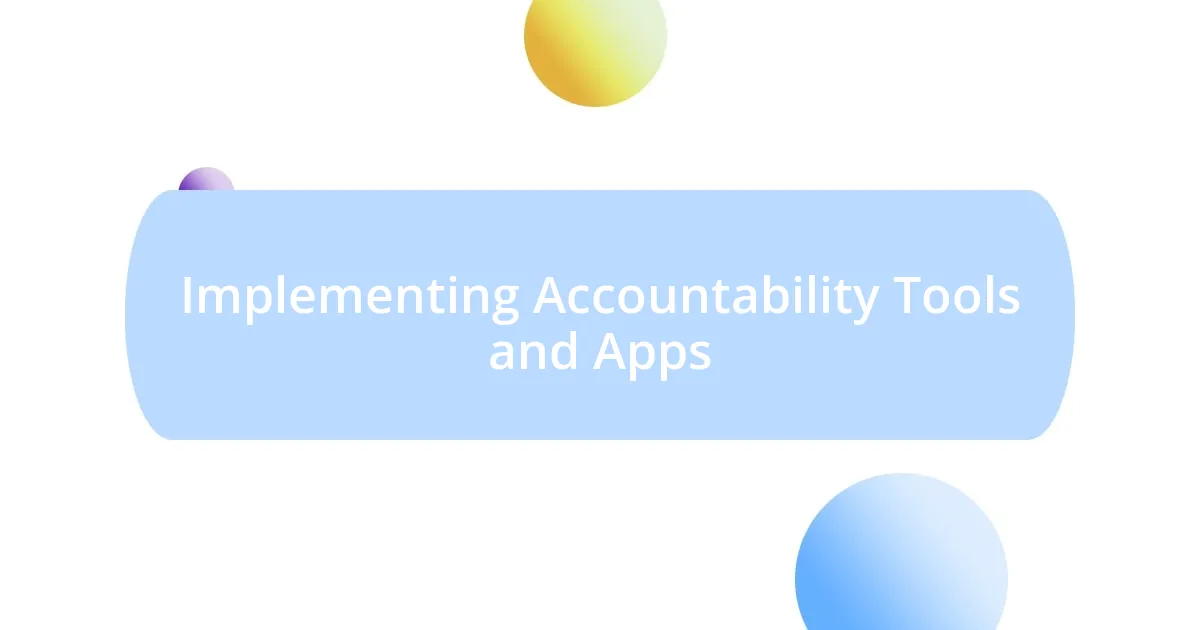
Implementing Accountability Tools and Apps
Implementing accountability tools and apps has transformed my approach to managing finances. I vividly remember the day I downloaded my first budgeting app. It felt like handing myself a financial GPS—suddenly, I could track spending in real-time, categorize expenses, and set saving goals all in one place. Have you ever experienced that rush of motivation when you see your progress laid out visually? It’s invigorating!
One app I swear by is Mint. It links directly to my bank accounts and automatically categorizes my spending, which has saved me countless hours each month. There was a moment when I stopped cringing at the thought of budgeting—I couldn’t wait to check in on my app, see how close I was to my savings goal, or even how certain expenses shaped up over the week. That little thrill of seeing the numbers shift in my favor? Absolutely priceless.
In my experience, collaboration tools like Splitwise have also made managing shared expenses with friends seamless and stress-free. I remember a weekend trip where we used it to track all our shared costs. Instead of awkward conversations about who owed what, the app did all the math for us, allowing us to enjoy our time without financial tension. Doesn’t it feel great when technology lifts that weight off your shoulders? By finding the right tools, I’ve cultivated a sense of accountability that keeps my financial goals within reach.
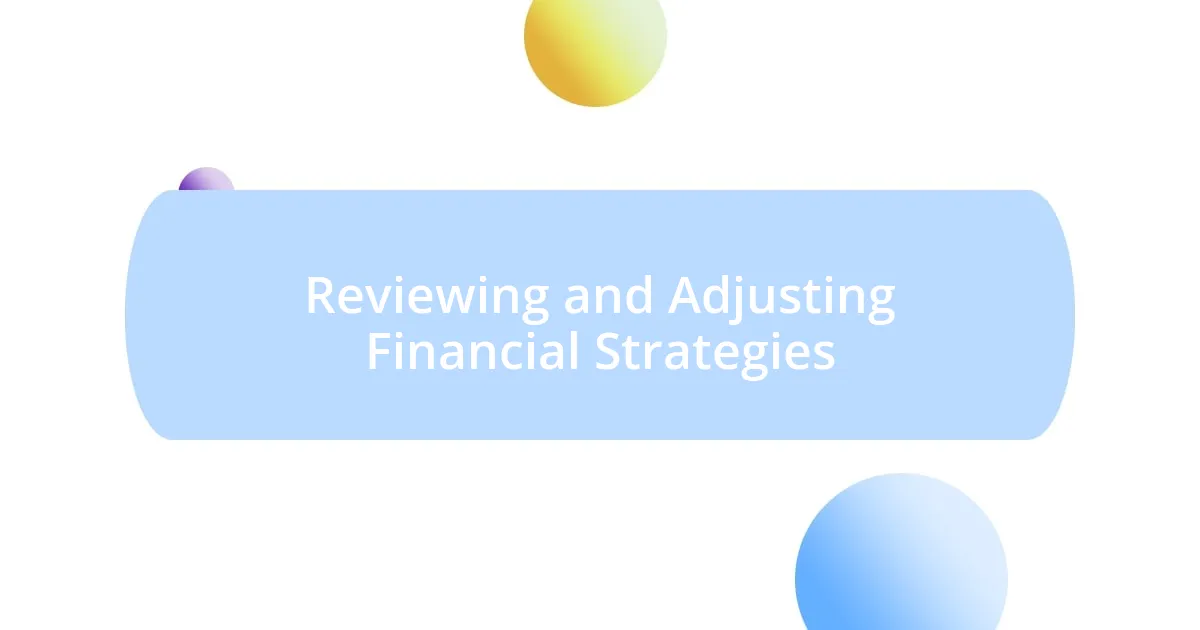
Reviewing and Adjusting Financial Strategies
Reviewing and adjusting financial strategies is something I consider essential for continual growth. I’ve made it a point to sit down monthly and assess how my expenditures align with my financial goals. This routine reflection not only highlights areas needing improvement but also reinforces my commitment to long-term objectives. Have you ever taken a moment to evaluate if your financial strategies are actually working for you?
I once found myself relying too heavily on credit for unexpected expenses, and it took that monthly review to recognize this pattern. As I adjusted my strategy, prioritizing an emergency fund became a non-negotiable. The transformation in my attitude towards savings was profound; it felt like building a safety net that caught me before I fell into debt. Isn’t it empowering to realize that you can change your financial trajectory?
As I fine-tuned my techniques, I began tracking key performance indicators, like savings rate and debt reduction progress. This gave me a tangible sense of accomplishment and clarity on where I was headed. By regularly revisiting these metrics, I’ve been able to pivot and respond proactively to changes. It’s an ongoing cycle of learning and growing—don’t you think that’s the beauty of financial accountability?












